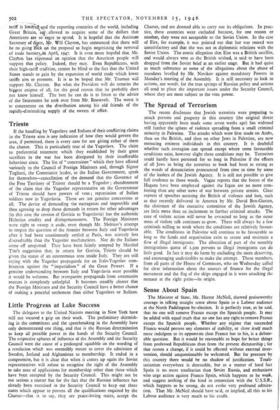Little Progress at Lake Success
The delegates to the United Nations meeting in New York have still not secured a grip on their work. The preliminary skirmish- ing in the committees and the speechmaking in the Assembly have only demonstrated one thing, and that is the Russian determination to keep all possible power in the hands of the Security Council. The respective spheres of influence of the Assembly and the Security Council were the cause of a prolonged squabble on the wording of a resolution which was ostensibly meant to cover the admission of Sweden, Iceland and Afghanistan to membership. It ended in a compromise, but it is clear that when it comes up again the Soviet representatives will refuse to recognise the right of the Assembly to take note of applications for membership other than those which have been accepted by the Security Council. This might not be too serious a matter but for the fact that the Russian influence has already been exercised in the Security Council to keep out three states which appear to possess all the qualifications required by the Charter—that is to say, they are peace-loving states, accept the
Charter, and are deemed able to carry out its obligations. In prac- tice, these countries were excluded because, for one reason or another, they were not acceptable to the Soviet Union. In the case of Eire, for example, it was pointed out that her war record was unsatisfactory and that she was not in diplomatic relations with the Soviet Union. The comic allegation that Eire was a British satellite, and would always vote as the British wished, is said to have been dropped from the Soviet brief at an earlier stage. But it had quite as much substance as some of the allegations about the abuse of mandates levelled by Mr. Novikov against mandatory Powers in Monday's meeting of the Assembly. It is still necessary to look to actions, not words, for the true springs of Russian policy and actions all tend to place the important issues under the Security Council, where they are most subject to the veto power.


































 Previous page
Previous page